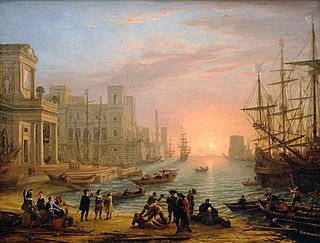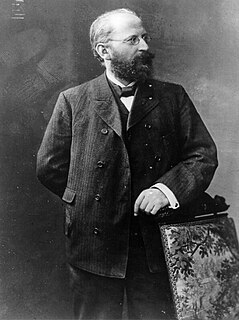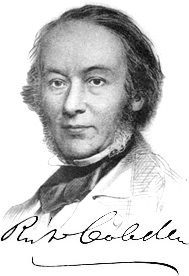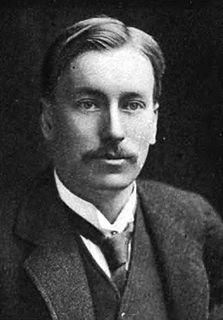Related Research Articles
Capitalism is an economic system based on the private ownership of the means of production and their operation for profit. Central characteristics of capitalism include capital accumulation, competitive markets, a price system, private property and the recognition of property rights, voluntary exchange and wage labor. In a capitalist market economy, decision-making and investments are determined by every owner of wealth, property or production ability in capital and financial markets whereas prices and the distribution of goods and services are mainly determined by competition in goods and services markets.
Classical liberalism is a political ideology and a branch of liberalism that advocates civil liberties under the rule of law with an emphasis on economic freedom. Closely related to economic liberalism, it developed in the early 19th century, building on ideas from the previous century as a response to urbanization and to the Industrial Revolution in Europe and North America.

Imperialism is a policy or ideology of extending the rule over peoples and other countries, for extending political and economic access, power and control, often through employing hard power, especially military force, but also soft power. While related to the concepts of colonialism and empire, imperialism is a distinct concept that can apply to other forms of expansion and many forms of government.

Mercantilism is an economic policy that is designed to maximize the exports and minimize the imports for an economy. It promotes imperialism and tariffs and subsidies on traded goods to achieve that goal. The policy aims to reduce a possible current account deficit or reach a current account surplus, and it includes measures aimed at accumulating monetary reserves by a positive balance of trade, especially of finished goods. Historically, such policies frequently led to war and motivated colonial expansion. Mercantilist theory varies in sophistication from one writer to another and has evolved over time.

Hegemony is the political, economic, or military predominance or control of one state over others. In ancient Greece, hegemony denoted the politico-military dominance of a city-state over other city-states. The dominant state is known as the hegemon. In the 19th century, hegemony came to denote the "Social or cultural predominance or ascendancy; predominance by one group within a society or milieu". Later, it could be used to mean "a group or regime which exerts undue influence within a society". Also, it could be used for the geopolitical and the cultural predominance of one country over others, from which was derived hegemonism, as in the idea that the Great Powers meant to establish European hegemony over Africa, Asia and Latin America.

John Atkinson Hobson was an English economist and social scientist. Hobson is best known for his writing on imperialism, which influenced Vladimir Lenin and his theory of underconsumption.
Laissez-faire is an economic system in which transactions between private groups of people are free from or almost free from any form of economic interventionism such as regulation and subsidies. As a system of thought, laissez-faire rests on the axioms that the individual is the basic unit in society and has a natural right to freedom; that the physical order of nature is a harmonious and self-regulating system; and that corporations are creatures of the state and therefore the citizens must watch them closely due to their propensity to disrupt the Smithian spontaneous order.

Eduard Bernstein was a German social democratic Marxist theorist and politician. A member of the Social Democratic Party of Germany (SPD), Bernstein had held close association to Karl Marx and Friedrich Engels, but he began to identify what he believed to be errors in Marxist thinking and began to criticize views held by Marxism when he investigated and challenged the Marxist materialist theory of history. He rejected significant parts of Marxist theory that were based upon Hegelian metaphysics and rejected the Hegelian dialectical perspective.

Richard Cobden was an English manufacturer, Radical and Liberal MP, associated with two major free trade campaigns, the Anti-Corn Law League and the Cobden–Chevalier Treaty.

The Anti-Corn Law League was a successful political movement in Great Britain aimed at the abolition of the unpopular Corn Laws, which protected landowners’ interests by levying taxes on imported wheat, thus raising the price of bread at a time when factory-owners were trying to cut wages. The League was a middle-class nationwide organisation that held many well-attended rallies on the premise that a crusade was needed to convince parliament to repeal the corn laws. Its long-term goals included the removal of feudal privileges, which it denounced as impeding progress, lowering economic well-being, and restricting freedom. The League played little role in the final act in 1846 when Sir Robert Peel led the successful battle for repeal. However, its experience provided a model that was widely adopted in Britain and other democratic nations to demonstrate the organisation of a political pressure group with the popular base.

In Marxist philosophy, cultural hegemony is the domination of a culturally diverse society by the ruling class which manipulates the culture of that society—the beliefs and explanations, perceptions, values, and mores—so that the imposed, ruling-class worldview becomes the accepted cultural norm; the universally valid dominant ideology, which justifies the social, political, and economic status quo as natural and inevitable, perpetual and beneficial for every social class, rather than as artificial social constructs that benefit only the ruling class. This Marxist analysis of how the ruling capitalist class establishes and maintains its control was originally developed by the Italian philosopher and politician Antonio Gramsci (1891–1937).

Imperialism: A Study (1902), by John A. Hobson, is a politico–economic discourse about the negative financial, economic, and moral aspects of imperialism as a nationalistic business enterprise. Hobson argues that capitalist business activity brought about imperialism.
The history of capitalism is diverse. The concept of capitalism has many debated roots, but fully fledged capitalism is generally thought by scholars to have emerged in Northwestern Europe, especially in Great Britain and the Netherlands, in the 16th to 17th centuries. Over the following centuries, capital accumulated by a variety of methods, at a variety of scales, and became associated with much variation in the concentration of wealth and economic power. Capitalism gradually became the dominant economic system throughout the world.(subscription required) Much of the history of the past 500 years is concerned with the development of capitalism in its various forms.
Manchester Liberalism comprises the political, economic and social movements of the 19th century that originated in Manchester, England. Led by Richard Cobden and John Bright, it won a wide hearing for its argument that free trade would lead to a more equitable society, making essential products available to all. Its most famous activity was the Anti-Corn Law League that called for repeal of the Corn Laws that kept food prices high. It expounded the social and economic implications of free trade and laissez-faire capitalism. The Manchester School took the theories of economic liberalism advocated by classical economists such as Adam Smith and made them the basis for government policy. It also promoted pacifism, anti-slavery, freedom of the press and separation of church and state.

Francis Wrigley Hirst was a British journalist, writer and editor of The Economist magazine. He was a Liberal in party terms and a classical liberal in ideology.
Liberalism is a political and moral philosophy based on liberty, consent of the governed and equality before the law. Liberals espouse a wide array of views depending on their understanding of these principles, but they generally support free markets, free trade, limited government, individual rights, capitalism, democracy, secularism, gender equality, racial equality, internationalism, freedom of speech, freedom of the press and freedom of religion. Yellow is the political colour most commonly associated with liberalism.

The historiography of the British Empire refers to the studies, sources, critical methods and interpretations used by scholars to develop a history of Britain's empire. Historians and their ideas are the main focus here; specific lands and historical dates and episodes are covered in the article on the British Empire. Scholars have long studied the Empire, looking at the causes for its formation, its relations to the French and other empires, and the kinds of people who became imperialists or anti-imperialists, together with their mindsets. The history of the breakdown of the Empire has attracted scholars of the histories of the United States, the British Raj, and the African colonies. John Darwin (2013) identifies four imperial goals: colonising, civilising, converting, and commerce.
Internationalism is a political principle that advocates greater political or economic cooperation among states and nations. It is associated with other political movements and ideologies, but can also reflect a doctrine, belief system, or movement in itself.
Anti-imperialism in political science and international relations is a term used in a variety of contexts, usually by nationalist movements who want to secede from a larger polity or as a specific theory opposed to capitalism in Marxist–Leninist discourse, derived from Vladimir Lenin's work Imperialism, the Highest Stage of Capitalism. A less common usage is by supporters of a interventionist foreign policy.
Capitalism and Slavery is the published version, first appearing in 1944, of the doctoral dissertation of Eric Williams, who was the first Prime Minister of Trinidad and Tobago in 1962. It advances a number of theses on the impact of economic factors on the decline of slavery, specifically the Atlantic slave trade and slavery in the British West Indies, from the second half of the 18th century. It also makes criticisms of the historiography of the British Empire of the period: in particular on the use of the Slavery Abolition Act of 1833 as a sort of moral pivot; but also directed against a historical school that saw the imperial constitutional history as a constant advance through legislation. It uses polemical asides for some personal attacks, notably on the Oxford historian Reginald Coupland.
References
- ↑ Palen, M.-W. (2015). ”Free-Trade Ideology and Transatlantic Abolitionism: A Historiography”. Journal of the History of Economic Thought, 37(2), pp. 291–304.
- ↑ Cain, P.J. & J.A. Jobson (1978). “Cobdenism, and the Radical Theory of Economic Imperialism, 1898–1914”. The Economic History Review, 31(4), pp. 565–584.
- ↑ Daunton, M. (2007). ”Britain and Globalisation since 1850: II. The Rise of Insular Capitalism, 1914–1939”. Transactions of the Royal Historical Society , 17, pp. 1–33.
- ↑ Young, J.P. (1898). “The Decay of Cobdenism in England”. The North American Review, 166(497), pp. 418–428.
- ↑ Castorina, C. (1985). “Cobdenism for the 1980s”. Economic Affairs, 5(2), pp. 58–60.